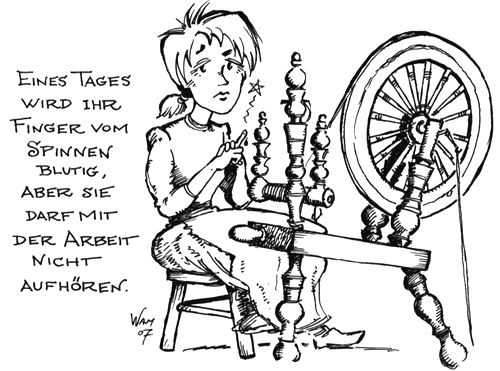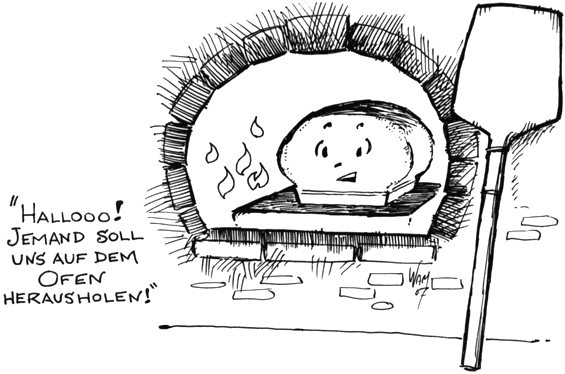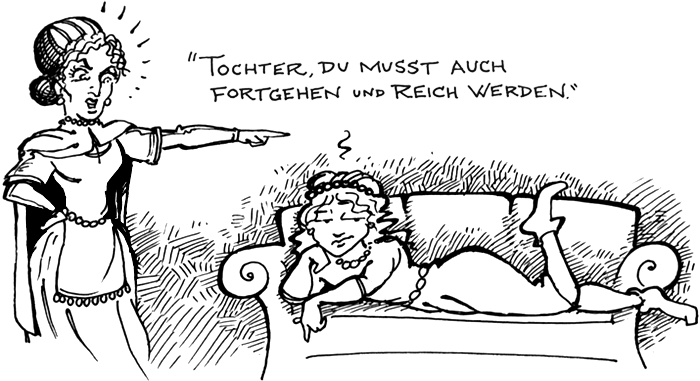10.6.1.3: Modalverben im Präsens
- Page ID
- 108508
Meaning
While verbs are used to describe actions, modal verbs add to the meaning by providing some nuance or by suggesting some emotional reaction to an action. Consider the following English examples:
The good girl spins at the well.
The good girl must spin at the well.
The good girl should spin at the well.
In the first sentence, the girl is actually spinning thread right now. In the second one, she must spin because somebody demands it of her (but she may or may not be spinning right now). The third sentence indicates that she has a duty that she is apparently rejecting for something more exciting ...
Thus, modal verbs modify other verbs. They are followed by an infinitive (the basic form of a verb, what you would find in the dictionary).
The modal verbs
There are six – or seven – modal verbs in German: dürfen, können, mögen (+möchten), müssen, sollen, wollen
| 1. dürfen • be allowed to, be permitted to | |
| ich darf | wir dürfen |
| du darfst | ihr dürft |
| er/sie/es darf | sie dürfen |
Be aware that the negative of dürfen really means "must not" or "may not" (it is a prohibition).
| Eine Witwe hat zwei Töchter: Die eine ist verwöhnt und die andere darf nichts tun außer arbeiten. | A widow has two daughters: one is spoiled, the other one is only allowed to work. |
| Eines Tages wird ihr Finger vom Spinnen blutig sein, aber sie darf mit der Arbeit nicht aufhören. | One day her finger gets bloody from the spinning, but she is not allowed to stop working. |
| Tja, das ist leider das Schicksal von allen Waisen in diesen Märchen; sie dürfen am Anfang der Geschichte nicht glücklich sein! | Oh well, that is unfortunately the fate of all orphans in these fairy tales; they are not allowed to be happy at the beginning of the story! |

| 2. können • able to, can | |
| ich kann | wir können |
| du kannst | ihr könnt |
| er/sie/es kann | sie können |
Although in American English 'can' is often used interchangeably with 'allowed to' ('Mom, can we go home now?'), in German the meaning of these two words are distinct. dürfen indicates the permission to do something, können means the ability/skill to do something.
| Die Spule wird auch blutig, aber das Mädchen kann sie nicht waschen, weil der Brunnen zu tief ist. | The spool gets bloody too, but the girl can not wash it because the well is too deep. |
| Aber was zunächst passiert, kann ich gar nicht verstehen: Die Stiefmutter sagt dem Mädchen, dass sie in den Brunnen springen und die Spule zurückbringen muss. | But I can not understand at all what happens next: the stepmother tells the girl that she has to jump in the well and bring back the spool. |
There is an idiomatic expression with können that you may want to practice using:
| Das kann (wohl) sein | That's (entirely) possible |
| 3. mögen/möchten • like/would like (to) | |
| ich mag | wir mögen |
| du magst | ihr mögt |
| er/sie/es mag | sie mögen |
mögen means to like ... Unlike the other modal verbs, it is not used to modify a verb; rather, it's used with nouns: Ich mag Tee lieber als Kaffee (I like tea better than coffee). These nouns have to be in the accusative. To negate mögen, you need to use kein/keine with a noun and nicht if you are negating the mögen itself.
| Das Mädchen | Warum mögt ihr mich nicht? | Why don't you guys like me? |
| Die Stiefmutter | Wir mögen keine Waisen, weil wir böse sind. So muss das sein, um unser Märchen bedeutungsvoll zu machen. | We don't like orphans because we are evil. It has to be that way, in order to make our tale meaningful. |
möchten is not really a full-blown modal verb; it is a form of mögen (the subjunctive form) and is used for a softer version of like – namely, it means would like. mögen is used with verbs or with nouns. The nouns are in the accusative here, too.
| möchten • would like (to) | |
| ich möchte | wir möchten |
| du möchtest | ihr möchtet |
| er/sie/es möchte | sie möchten |
Two additional, useful expressions: möchte gern (would really like to ...) and möchte lieber (would prefer to ...)
| Das Mädchen | Ich glaube, ich möchte lieber in ein anderes Märchen umziehen. | I think, I would really prefer to move to another fairy tale. |
| Die Stiefmutter | Ich glaube, du möchtest in den anderen Geschichten auch nicht sein. Sie sind alle etwas grausam und moralistisch übertrieben. | I believe that you wouldn't like the other stories either. They are all a bit dreadful and excessively moralistic. |
| Das Mädchen | Ja, aber einmal möchte ich das gerne ausprobieren! | Yeah, but at least once I'd really like to try it! |

| 4. müssen • must, have to | |
| ich muss | wir müssen |
| du musst | ihr müsst |
| er/sie/es muss | sie müssen |
müssen means the same as the English must in positive (declarative) sentences and in questions. However, when you negate it and say müssen nicht, it is not the same as the English must not (which really means that you are not supposed to or not allowed to something => in German means "dürfen nicht"). Rather, it means that you do not have to do something. In other words:
| du musst | = | you must, you have to |
| du musst nicht | = | you do not have to (≠ you must not) |
| du darfst nicht | = | you must not (you may not, you are not allowed) |
| die Stiefmutter | Also, wo waren wir? Ach ja, du musst in den Brunnen hineinspringen und deine Spule zurückbringen! | So, where were we? Oh, yeah, you must jump into the well and bring your spool back! |
| das Mädchen | Schade! Aber wenn ich ertrinke, muss ich wenigstens nicht mehr spinnen! | Bummer! But if I drown, at least I don't have to spin anymore. |
| 5. sollen • supposed to | |
| ich soll | wir sollen |
| du sollst | ihr sollt |
| er/sie/es soll | sie sollen |
sollen does not really mean the same as should, such as in "you should really be happy that you jumped into the well!" Rather, sollen indicates an expectation or a duty or an obligation.
The more general English should can be expressed in a variety of ways in German: Ach, nimm uns doch aus dem Ofen! (oh, you should really take us out of the oven!) or Sie müsste viel mehr arbeiten! (she should work much more!). müsste is in the subjunctive, and the subjunctive form of sollen (sollte, solltest, etc.) can also mean should in the more everyday sense, as it is used in English.
| das Brot im Ofen | Halloooo! Jemand soll uns aus dem Ofen herausholen! | Helloooo! Somebody is supposed to take us out of the oven! |
| das Mädchen | Ja, ich glaube, dass ich das tun soll. | Yes, I believe that I am the one who is supposed to do that. |
| das Brot im Ofen | Richtig. Nach dem Drehbuch sollen wir nur im zweiten Akt im Ofen bleiben und verkohlen. | Yes, according to the screen-play, we are only supposed to be left burning in the oven in act two. |

| 6. wollen • want to | |
| ich will | wir wollen |
| du willst | ihr wollt |
| er/sie/es will | sie wollen |
wollen is pretty straightforward, and means the same – and is used the same way – as the English equivalent want to. The only difficulty that sometimes arises is in its singular forms, which look deceptively like the English will (as in "sometime in the future I will return to Frau Holle"). The German wollen, in no shape or form, is used to form the future tense! In other words:
| Ich will zu Frau Holle zurückgehen. | = | I want to return to Frau Holle. |
| Ich werde zu Frau Holle zurückgehen. | = | I will return to Frau Holle. |
| Frau Holle | Herzlich willkommen, liebes Kind! Wenn du bei mir bleiben willst, musst du aber sehr hart arbeiten! | Welcome, darling child! If you want to stay with me, however, you really have to work hard! |
| das Mädchen | Ja, das will ich tun; das Leben hier ist viel gemütlicher als zu Hause, und ich arbeite gern! | Yes, that's what I want to do; life here is much cozier than at home, and I like to work! |
| Frau Holle | Braves Mädchen! Ich mag deine protestantische Arbeitsmoral! | Good girl! I like your protestant work ethic! |
Word order
Basic
Typically, the conjugated modal verb takes the second position in a sentence or clause, and an infinitive comes at the end of the sentence or clause.
| die Stiefmutter | Tochter, du musst auch fortgehen und reich werden wie das andere Mädchen. | Daughter, you have to go out and become rich, like the other girl. |
| die Stiefschwester | Ja, ich möchte sehr gern reich werden. Es ist nur so, dass ich nicht gern arbeite ... | Yes, I would very much like to become rich. It's only that I don't like to work so much ... |

With coordinating conjunctions
This same pattern – conjugated modal verb in second position and infinitive at the end of a sentence or clause – holds true when two sentences (that become two clauses of a new, complex sentence) are connected by coordinating conjunctions: aber, beziehungsweise, denn, entweder ... oder ..., oder, sondern, und, weder ... noch ...
| das brave Mädchen | Du musst zuerst drei Proben bestehen, und danach kannst du mit dem Gold nach Hause zurückkommen. | First, you have to pass three tests, and then you can come back home with the gold. |
With subordinating conjunctions
The situation changes drastically with subordinating conjunctions, such as als, bevor, dass, ob, weil. Just as in other sentences with subordinating conjunctions, the conjugated verb (here the modal verb) goes to the end of the sentence or clause (the infinitive, which used to be at the end of the clause is now second-to-last, because the last slot is filled with the conjugated modal verb).
| Ich will zu Frau Holle zurückkommen. | = | Ich will zurück zu Frau Holle. |
| Ich muss aufs Klo gehen. | = | Ich muss aufs Klo. |
| Darf ich wieder nach Hause gehen? | = | Darf ich wieder nach Hause? |
2. Ability/skill
You can leave off an infintive after können if the infinitive would be sprechen (to speak) and the object is the name of a language or tun (to do) and the object(s) make it clear that tun is the omitted element:
| Frau Holle, können Sie Deutsch sprechen? | = | Frau Holle, können Sie Deutsch? |
| Ja, natürlich kann ich das tun! | = | Ja, natürlich kann ich das. |


